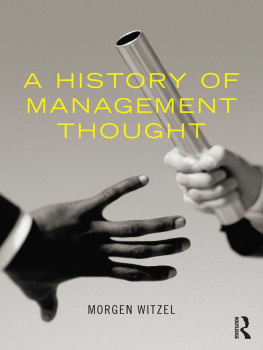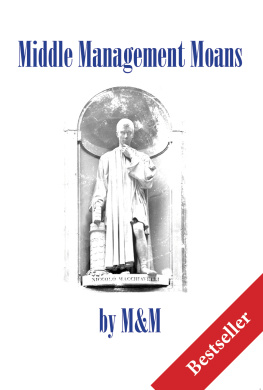A History of Management Thought
For the past three thousand years people have been thinking about the problems of management. This book shows how thinking about management has evolved and changed. It shows how changing social, political and technological forces have challenged people to think about management in new ways, and how management thinkers have responded. Sometimes their responses missed the mark and, occasionally, great ideas about management failed to be picked up and were lost along the way. Sometimes, truly original and creative, even world-changing ideas appeared.
Following key currents in management thought from the origins of civilization to the present day, the book begins in the ancient world, when people were wrestling with the problems of organization and leadership. It continues through the Middle Ages, East and West, as people pondered on how to manage risk and think strategically, and on the role of business in society. It shows how the Industrial Revolution led to the emergence of scientific management, and how political and social events of the twentieth century shaped management thinking right up to the present day.
From the pyramids to Facebook, from military strategy to managing for sustainability, A History of Management Thought tells the fascinating story of how management thinking has changed, shifted, evolved and developed down through the centuries. Students taking classes in the history of management thought will find this text to be the perfect accompaniment to their studies and will be a captivating read for anyone else.
Morgen Witzel is a Fellow of the Centre for Leadership Studies, University of Exeter, UK. A writer, lecturer and consultant on business and management, especially on the history of management, he is the author of hundreds of articles for the academic and popular press and has written eighteen books, including: Doing Business in China; Management: The Basics; and Management History, all available from Routledge.
A History of Management Thought
Morgen Witzel

First published 2012
by Routledge
2 Park Square, Milton Park, Abingdon, Oxon OX14 4RN
Simultaneously published in the USA and Canada by Routledge
711 Third Avenue, New York, NY 10017
Routledge is an imprint of the Taylor & Francis Group, an informa business
2012 Morgen Witzel
The right of Morgen Witzel to be identified as author of this work has been asserted by him in accordance with sections 77 and 78 of the Copyright, Designs and Patents Act 1988.
All rights reserved. No part of this book may be reprinted or reproduced or utilized in any form or by any electronic, mechanical, or other means, now known or hereafter invented, including photocopying and recording, or in any information storage or retrieval system, without permission in writing from the publishers.
Trademark notice: Product or corporate names may be trademarks or registered trademarks, and are used only for identification and explanation without intent to infringe.
British Library Cataloguing in Publication Data
A catalogue record for this book is available from the British Library
Library of Congress Cataloging in Publication Data
Witzel, Morgen.
A history of management thought / Morgen Witzel.
p. cm.
Includes bibliographical references and index.
1. ManagementHistory. 2. Management scienceHistory. I. Title.
HD30.5.W577 2011
658.009 dc23
2011025919
ISBN: 978-0-415-60057-6 (hbk)
ISBN: 978-0-415-60058-3 (pbk)
ISBN: 978-0-203-14560-9 (ebk)
Acknowledgements
Over the course of nearly fifteen years of studying and thinking about the history of management, I have been influenced by many people and many ideas. I should like first of all to thank my professors and lecturers in history at the University of Victoria in Canada, who first made me realize that history is not just a collection of interesting stories, but a rich source of knowledge that can, should we care to do so, be applied to the problems of the present and even the future. Whether they meant to or not, they turned me into an applied historian.
My views on business and management were formed while working, first as a research officer and then on contract, at London Business School. While there, I learnt to appreciate the power of management education and also, some of its failings. My subsequent years of lecturing on management history and other subjects at the University of Exeter Business School confirmed my belief in the utter necessity of management education, while at the same time enhancing my understanding of the weaknesses of the current system. And along the way, I became even more convinced that the application of lessons from history can solve some of those weaknesses.
I want to pay a special tribute to the University of Exeter MBA students who took my module, From the Medici to Microsoft: The Making and Integration of Management, from 200311. Their views, their ideas and their understanding helped to shape my own thinking to a great degree.
Many other people have been generous with their time and thoughts over the years, all adding in some way to my own knowledge and/or my understanding of why management history is important. They include Tim Ambler, Mie Augier, George Bickerstaffe, the late Edward Brech, Peter Case, John Child, Tim Dickson, Jonathan Gosling, Kris Inwood, Donna Ladkin, Ronnie Lessem, David Lewis, Raoul McLaughlin, Karl Moore, James Pickford, Sasaki Tsuneo, Bodo Schlegelmilch, Jonathan Schroeder, J.C. Spender, Billy So, Peter Starbuck, Malcolm Warner, Daniel Wren, Chao Xi and Milan Zeleny, and almost certainly many others whom I have overlooked.
I would like also to thank Terry Clague of Routledge, who commissioned this book, for giving me the opportunity to write it and for his support through the process.
Marilyn Livingstone has been a constant source of ideas, inspiration, critical comment and help and support when needed. To her, as ever, my eternal thanks and gratitude
1 Introduction
A sense of the past is essential to anyone who is trying to understand the here-and-now of industrial organisation. What is happening now is part of a continuing development.
(Tom Burns)
Any history of management thought needs perforce to begin by defining what is meant by management thought, and then explain what it is about the history of management thought that makes it important and worthy of study. There are two ways of defining management thought: we can take it to mean coherent theories or systems of management, or we can broaden the scope of the term and refer more generally to thinking about management, ideas about the meaning, purpose, function and tasks of management which are important and relevant but do not necessarily amount to a coherent overall theory.
The problem, though, is defining where the boundary lies. The year 2011 marks the 100th anniversary of the publication of arguably the most influential work of management thinking of all time, Frederick Winslow Taylors The Principles of Scientific Management. Scientific management was one of the first major systems of thinking about management to be developed, though it must be pointed out that it emerged at a time which was very rich in thinking about management generally. Taylors contemporaries included people such as Harrington Emerson, Henri Fayol, Lyndall Urwick and others who developed their own concepts of management. As we shall see later in this book, scientific management was the concept that proved to be most durable.
If we take the first definition of management thought given above, then our study should commence with scientific management a century ago and move forward in time from there. But how and why did scientific management emerge? To answer that question, we need to go back to the late nineteenth century and the first calls for improvement in management methods. And what led to those calls for improvement and change? To answer
Next page













